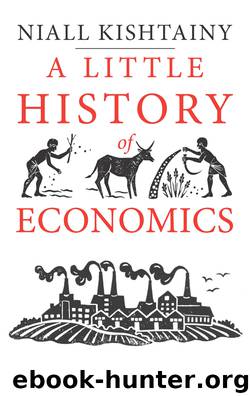A Little History of Economics by Niall Kishtainy

Author:Niall Kishtainy
Language: eng
Format: epub
ISBN: 9780300206364
Publisher: Yale University Press
CHAPTER 22
The Big Push
Just before midnight on 6 March 1957, the president of Ghana, Kwame Nkrumah, stood on a podium gazing down on a cheering crowd of his fellow citizens. For the previous eighty years Ghana had been a colony (a nation ruled over by a foreign country), but as the clock struck twelve Nkrumah declared that Ghana was free forever. In that moment his country became the first colonised black African nation to gain independence. At the polo ground in the capital city of Accra, where the official celebrations were taking place, the British Union Jack – the flag of Ghana’s old colonial ruler – was lowered and a new red, yellow and green one was raised. ‘Children of Ghana arise and uphold your cause,’ sang the crowds. Ghana was a trailblazer. A few years later the British prime minister, Harold Macmillan, talked of ‘winds of change blowing through this continent’ and during the 1960s dozens of colonies in Africa and further afield gained their independence.
Nkrumah made a single, independent nation out of a patchwork of provinces and peoples. An arch built in Accra, carved with the words ‘AD 1957 Freedom and Justice’, marked the new era. Nkrumah knew that the words meant much more than a colourful flag and a new national anthem. Freedom and justice would only exist when his people had enough to eat, were healthy and housed, and could read and write. Before independence, Ghana had earned a lot of money from selling its cocoa. Some of this wealth had gone into building roads and railways. Even so, like many of the newborn nations, Ghana was a poor country. Nearly a quarter of children died before their fifth birthdays and average incomes were a tiny fraction of European levels. Nkrumah promised that Ghana would become a paradise within a decade.
Taking part in the independence celebrations was Nkrumah’s economic adviser, Arthur Lewis (1915–91), who’d been raised in a poor backwater of the British Empire, the island of Saint Lucia in the Caribbean. As a teenager he’d hoped to become an engineer, but soon realised that the white-run sugar plantations would never employ a black engineer. After he graduated from London University in the 1930s, The Economist magazine turned him down on the grounds that he’d have to interview people who wouldn’t want to talk to a black journalist. Later came triumphs: in 1938 he became the first person of African descent to be appointed a lecturer at the London School of Economics, and in 1979 he won the Nobel Prize for economics, to this day the only black person to have done so.
Lewis observed that unlike those of rich countries, poor nations’ economies are full of contrasts between the ‘modern’ and the ‘traditional’, for example between luxury shops and the street sellers hanging around outside them. The modern part consists of capitalist farms and industries that hire workers in order to make goods to sell at a profit. The traditional part consists of family farms and businesses that share their proceeds among relatives and friends instead of maximising profit.
Download
This site does not store any files on its server. We only index and link to content provided by other sites. Please contact the content providers to delete copyright contents if any and email us, we'll remove relevant links or contents immediately.
International Integration of the Brazilian Economy by Elias C. Grivoyannis(57326)
The Radium Girls by Kate Moore(10907)
Turbulence by E. J. Noyes(7040)
Nudge - Improving Decisions about Health, Wealth, and Happiness by Thaler Sunstein(6633)
The Black Swan by Nassim Nicholas Taleb(6192)
Pioneering Portfolio Management by David F. Swensen(5606)
Rich Dad Poor Dad by Robert T. Kiyosaki(5150)
Zero to One by Peter Thiel(4824)
Man-made Catastrophes and Risk Information Concealment by Dmitry Chernov & Didier Sornette(4738)
Secrecy World by Jake Bernstein(3783)
Millionaire: The Philanderer, Gambler, and Duelist Who Invented Modern Finance by Janet Gleeson(3569)
Skin in the Game by Nassim Nicholas Taleb(3462)
The Age of Surveillance Capitalism by Shoshana Zuboff(3423)
The Money Culture by Michael Lewis(3284)
Skin in the Game: Hidden Asymmetries in Daily Life by Nassim Nicholas Taleb(3264)
Bullshit Jobs by David Graeber(3180)
The Dhandho Investor by Mohnish Pabrai(3169)
The Wisdom of Finance by Mihir Desai(3079)
Blockchain Basics by Daniel Drescher(2891)
